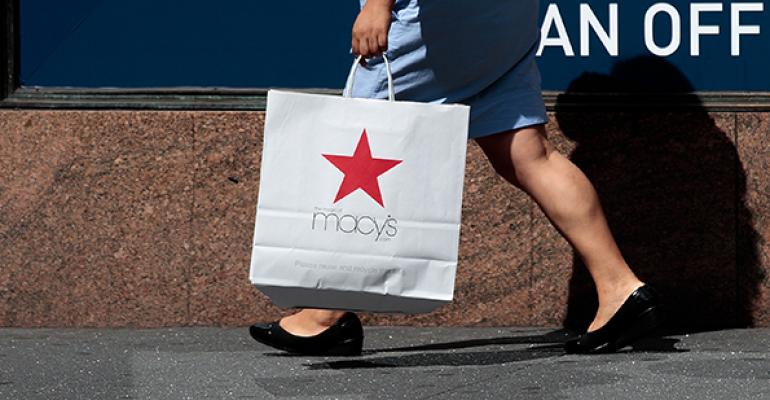(Bloomberg Gadfly)—We may need to brace for the demise of America's largest department-store chain.
Hudson's Bay Co., the Canadian owner of Lord & Taylor and Saks Fifth Avenue, is in talks to take over Macy's, according to a report from The Wall Street Journal Friday. It would be a spectacular end to a years-long struggle for what was once the star of the retail world.
Taking over the 158-year-old Macy's would be quite a feat for Hudson's Bay, given that its C$1.8 billion ($1.4 billion) in market value is a fraction of Macy's $13.4 billion market capitalization. (Macy's also has $7.5 billion in debt on its balance sheet.)
But Hudson's Bay is not some retail mastermind looking to bolster its brand with the iconic department store immortalized in "Miracle on 34th Street." Hudson's Bay is a shrewd real-estate operator more interested in the big buildings that house the clothes and shoes Macy's sells than the retail operation itself.
Macy's Market Cap
$13.4 Billion
So if Hudson's Bay does buy Macy's, there's no doubt its next steps would include shuttering hundreds of stores. And Macy's would lose its place as the leader of brick-and-mortar retail.
The best-case scenario then would be a chain of Macy's stores running a more-efficient business at a much smaller scale. The worst-case scenario: Hudson's Bay ends up looking more like Sears Holdings Corp., a decades-long asset sale bound to end with the bankruptcy of one of America's most storied companies.
So how would a Macy's takeover work? A look at the Hudson's Bay playbook shows how adroit it has been at buying companies and properties using complicated financial structures and very little cash.
For example, Hudson's Bay bought Saks Inc. for $2.4 billion in 2013, financing the deal with mostly new equity and debt. A few years later, Hudson's Bay took some of Saks's stores, among other properties, and formed a real-estate joint venture with mall operator Simon Property Group. Then, the joint venture borrowed millions of dollars, which Hudson's Bay used to pay down some of the debt it took on to buy Saks in the first place. The result was that Hudson's Bay got Saks, the company, for less than the price of Saks's flagship Fifth Avenue store.
Hudson's Bay used similar magic to buy German retailer Galeria Kaufhof for C$3.2 billion in 2015, financing the deal by selling 40 of 59 Kaufhof properties into its joint venture with Simon. No need to issue additional shares or take on more debt.
The best public data on what Macy's real estate is worth comes from a January 2016 presentation from activist hedge fund Starboard. Based on Starboard's estimates and some back-of-the-envelope math -- and assuming real estate values haven't gone down -- Macy's owned real estate is worth nearly $18 billion. ($21 billion minus $2.8 billion of leased space, excluding some properties Starboard valued at zero value).
Hudson's Bay could sell some of Macy's property into its joint venture with Simon, or another mall operator, given the interest such REITs would have in the chain, which operate in most big U.S. malls.
Hudson's Bay may have to issue additional shares and/or take on more debt to buy Macy's. But it could then get bank or other financing to mortgage the $18 billion worth of property at, say, 60 to 70 percent of total value. That would bring in $10 to $13 billion -- which, voila, could pay off most of the debt taken on to buy Macy's in the first place.
Obviously this is all over-simplified math, and there's no telling the maneuvers Hudson's Bay could make once it rolls its sleeves up on this kind of acquisition.
You also have to wonder how President Trump would respond to such a deal. His protectionist bent might inspire him to discourage a foreign company from taking over America's largest department store chain by sales -- but then you also have to consider his resentment of Macy's for pulling his clothing line from its stores during the election.
One thing is clear, anyway: Macy's is in play. And a sale to Hudson's Bay could be the end of the department-store chain as we know it.
This column does not necessarily reflect the opinion of Bloomberg LP and its owners.
To contact the author of this story: Shelly Banjo in New York at [email protected] To contact the editor responsible for this story: Mark Gongloff at [email protected]
COPYRIGHT
© 2017 Bloomberg L.P

